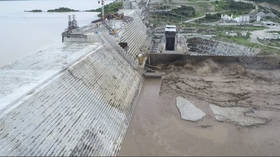Egypt accuses Ethiopia of ‘buying time’ in Nile dam dispute

Egypt has accused Ethiopia of attempting to “buy time” with negotiations while continuing to build a disputed dam on the Nile River without agreement.
“The continuation of the negotiations for 10 years without results is evidence of Ethiopian intransigence,” Egypt’s deputy foreign minister for African affairs, Hamdi Loza, said in a statement on Wednesday.
Loza also denied Ethiopia’s claims that Cairo was politicizing the Nile water issue and the dispute over the Grand Ethiopian Renaissance Dam (GERD).
He said Egyptian concerns about the repercussions of the project on its water security are real and based on documented scientific evidence.
The disagreement over the GERD dam has been ongoing for years, with Egypt and Sudan expressing concerns that its construction would negatively impact their water shares from the Nile.
According to Loza, Addis Ababa’s allegation “is an attempt to evade legal responsibility” and to “disregard the principles of international law and good neighborliness.”
Egypt’s minister of water resources and irrigation, Hani Sewilam, previously warned that unilateral actions concerning the GERD could pose an “existential danger” to the 150 million citizens of Egypt and Sudan.
According to local media reports, the minister stressed at the opening plenary of the 2023 UN Water Conference on Wednesday that “unilateral and non-cooperative practices in the operation” of the dam “can have a disastrous impact.”
Last month, the Ethiopian government accused Egypt of “politicizing” the Nile dam issue. The allegation came after the Arab League backed Egypt’s Nile water rights in a resolution on March 9. According to reports, the council urged Ethiopia to be flexible in filling and operating the GERD.
However, Addis Ababa expressed dissatisfaction with the resolution, saying it will continue to fill the dam and pursue an “African” solution to the crisis.
“The league is once again serving as the spokesperson of one state, disregarding basic principles of international law,” the Ethiopian Ministry of Foreign Affairs argued in a statement.













